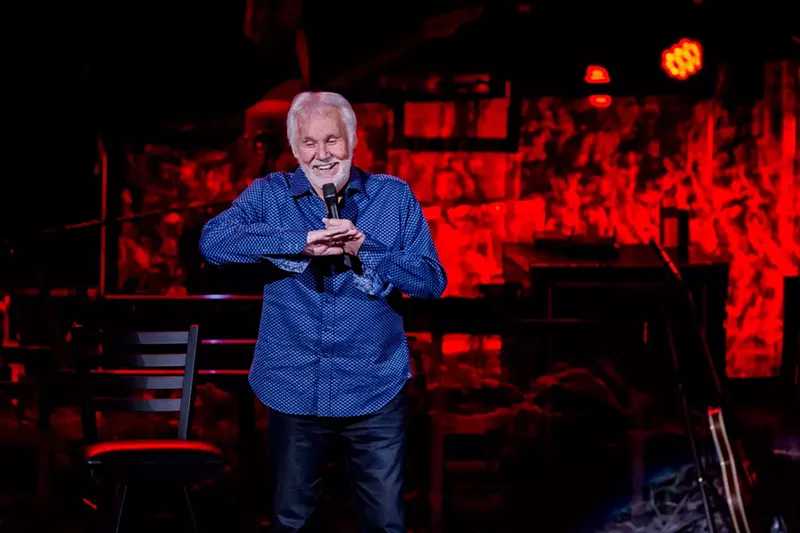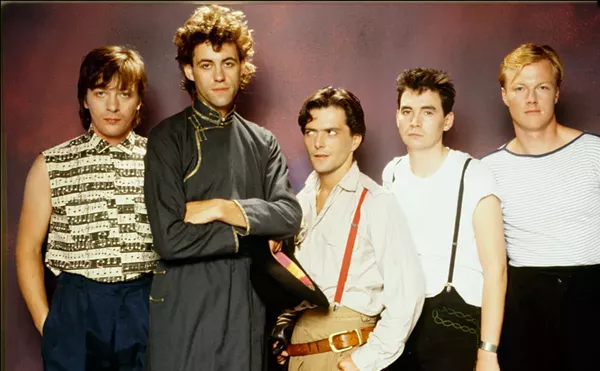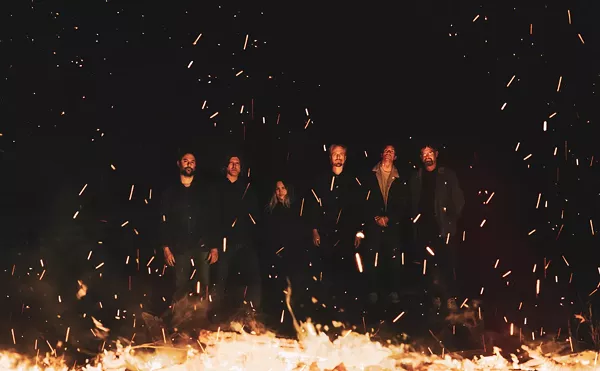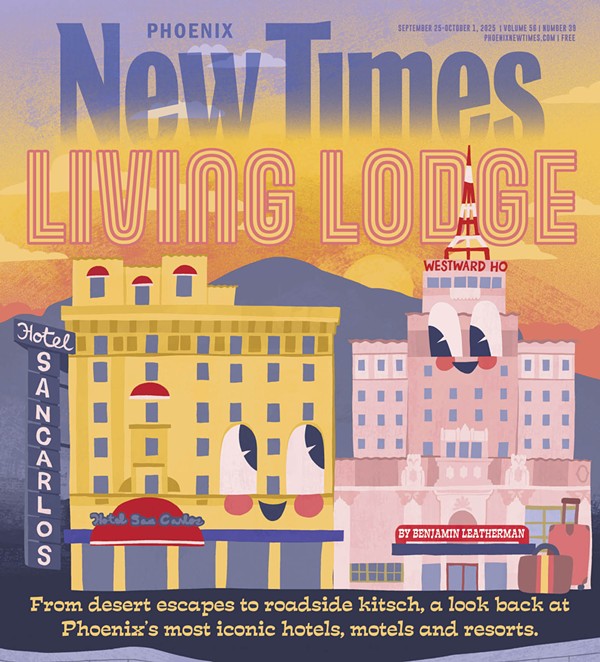Even with a storied career spanning more than five decades already firmly implanted in the American pop
culture landscape, country music legend Kenny Rogers is still breaking new ground, furthering his achievements, and streamlining his talents.
In 2013 alone, Rogers found himself accepting the Willie Nelson Lifetime Achievement Award, earning his induction into the Country Music Hall of Fame, publishing the novel What Are the Chances, releasing his 22nd Top 10 Country Album, You Can't Make Old Friends, as well as receiving a Grammy Award nomination for a duet with Dolly Parton on the album's title track.
Oh yeah, and the Professional Photographers of America awarded Rogers with an Honorary Masters of Photography this past January at a ceremony right here in Phoenix.
"It's been a great year," Rogers tells me in his identifiable soft, raspy voice with a bit of a chuckle. "I don't know what to look for next."
Fans may be wondering why the flare for photography? Well, it's simply in his nature and his never-settle-for-less, championship mentality. It is the same kind of winning quality and characteristic that NFL teams seek year after year when hunting that ever-elusive franchise quarterback. Or, to hear Rogers sum it up—"I impulsively get involved with something and I obsess with it. Once I do something kind of well, I think, 'How well can I do this?' and I apply myself. That's what gets me through the days out here."
Simply put—the 75 year old musician is still kicking ass while also teaching these modern day musical youngsters a thing or two about standing the test of time.
"Pay your taxes on time, and put twenty percent away," Rogers advises as if he were channeling "The Gambler" wisdom on knowing when to hold 'em, and when to fold 'em. "Some of the young talent won't have a dime when they're fifty years old, because they go through it with total disregard for when it ends. And the problem is, it will end— that's the nature of the business."
Up on the Sun spoke with Rogers in the days leading up to his performance at the Wild Horse Pass Hotel & Casino in Chandler this Sunday. He talks in-depth with us about the best album he's ever made, his view of the music industry in the last fifty years, teaching people English through his music, and so much more.
You were recently inducted into the Country Music Hall of Fame, and won a lifetime achievement award.
The Country Music Hall of Fame was a great experience. I said at the time that I am so glad it didn't happen at the peak of my success, because I'm not sure that I would have appreciated it as much. I have identical twin boys that are nine years old, I have two grown sons who live in California, and for all of us to be together with my wife and my brothers and sisters really meant a lot to me to finally accomplish and achieve that.
With the Willie Nelson Lifetime Achievement Award, those things are always wonderful, and I really appreciated being considered [for it], and I appreciated winning. This past year, I've also been given an Honorary Masters Degree of Photography by the Professional Photographers Association. It's been a great year! I don't know what to look for next. [laughs]
Can you describe your passion for photography?
Well, I'm an impulsive obsessive. I impulsively get involved with something and I obsess with it. Once I do something kind of well, I think, "How well can I do this?" and I apply myself. That's what gets me through the days out here. When you travel like we do, you have an hour and a half of this incredibly emotional high at nighttime where people are laughing and clapping and singing, but then you've got twenty-two and a half hours of nothing to do. So, I've always tried to fill that time with positive things, because I don't want to get into drugs, I never wanted to do that. I didn't know what else to do while I was on the road.
I love my ability to succeed in all of these genres. You know, I actually played tennis for ten years. [I] played eight hours a day, carried the tennis pole with me on the road, and developed a national ranking in doubles just from working hard and spending a lot of time at it. So, that's my nature.
Tell me why country music is the best?
I've always said that country music is the white man's rhythm and blues. It's where the pain is. With country music, I've had so many people from Korea and different parts of the world say they learned to speak English by listening to my music. Country music doesn't flower it— if it hurts, they say it hurts—and people can learn small sentences by listening. I just think there is so much knowledge and so much wisdom and so much sincerity in country music. The format of country music is designed to touch people, and I think it does.
Your album, You Can't Make Old Friends, was released last fall. How do you feel about its reception?
I think it's the best album I've ever done. I'm not saying it's going to sell, because records don't sell like they use to. It's an interesting thing, because you use to do concerts to promote album sales, and now you do albums to promote concert sales. It's a totally different world, and so you don't worry as much about album sales as you do getting it out there so people will come see the show.
They use to have to buy ten songs to get the one they wanted, and now they just download the one they want while the others go unheard. Well, a lot of things happen in that dynamic, and people do not really get to know the depth of the artist or what that person thinks about. When you hear a whole album, you pick up common denominators. My music has always basically fallen into two categories; one is social songs, which have some social comment.
If you go back and look at "Reuben James", it's about a black man who raised a white child. "Ruby, Don't Take Your Love to Town", is about a Vietnam War vet who came home and found out his wife was having an affair, and "Coward of the County" was about a rape. So, they all have some social significance to them.
The other category is ballads and love songs that say what every man would like to say, and every woman would like to hear. "Through the Years", "She Believes in Me", "You Decorated My Life", are all wonderful love songs. What man wouldn't want to say them, and what woman wouldn't want to hear them?
But you won't know that if you don't buy the album. It's kind of an American Idol mentality today. You're a hero for a while, and then you're replaced with another hero. Before, it was always my theory that the longer it took you to reach your height, the longer your glide ratio down was. That's why people of my genre have lasted so much longer than you anticipate the people of this era to, because they make it so quick, and they come down quick.
In the 50's when you began recording music, did you have an ultimate career goal in mind? And in your opinion, looking back, have you reached it today?
My goal was to meet girls — that's why I got into music. [laughs] And I've been married five times now, so yes, I think I've done everything I set out to do. I can laugh about it now, because Wanda [Miller] and I have been together twenty-one years and married sixteen and a half years. I have a great life.
I don't think most people get into the music business to make money, because the odds against it are astronomical. They get into it because of the love of music, and they want to make music. Money has never been a driving force for me. It's been a great by-product, but it's not what I set out to do.
Someone asked me the other day what I would tell kids coming up who are successful. I'd say, "Pay your taxes on time, and put twenty percent away." Everything else is incidental to that. You tend to live in the moment, and I think it's because everybody has something to prove to either themselves or the audience. Some of the young talent won't have a dime when they're fifty years old, because they go through it with total disregard for when it ends. And the problem is, it will end— that's the nature of the business.
What can the audience here in Phoenix expect from your live performance?
I'm an entertainer, I think more than a singer. It's not important to me that one person leave that audience saying, "He's the best singer I've ever heard." But it's important to me that everybody in that building leave saying, "I enjoyed that." So, that's my goal when I walk off stage— to have a good time and have the people enjoy it with me.
I will do about twenty-five hits, and occasionally I'll throw in some songs from the new album, because I have some really good stuff on there. I've been asked if I get tired of doing all my old hits and I said that if I had new ones I might, but since I don't have new ones I'll do my old ones. I think that's what people come to hear.
I went to see Ray Charles one time, he's a friend of mine, and he didn't do "Georgia on My Mind", and I got angry. I said, "Wait a minute, I paid a lot of money for these tickets." People don't just come because they like my smile, it's because they like the music I've done and that's what they want to hear. Music is the great memory-maker of all time.
For example, when I was a kid, "Earth Angel" was a big song. I still remember where I was the day I heard that song. I don't want to hear anybody do it but the original group. I think that's what people come for.
With all the changes in the music industry that you were talking about earlier, do you think it's for better or worse?
Change is always for the better. I've always said that country music is what country people will buy. So, when it ceases to be country, they'll quit buying it. Sooner or later it will go back to what it was before. Some guy is going to come along with that wonderful deep, rich Hank Williams voice, and do something where people say, "I'm so sick of what is out there, I want to hear more of this." That's what music does.
I know there are a lot of people anxious for your show here in Phoenix. It seems like your music reaches a diverse age group of fans after all these years. Well, I'm convinced that my audience falls into one of two categories; born since 1980, whose parents forced you to listen to my music as child abuse, or born before 1960, but can no longer remember the 60's. [laughs] Those are my groups.
Kenny Rogers is scheduled to perform on Sunday, March 23, at Wild Horse Pass Hotel & Casino in Chandler.
Find any show in Metro Phoenix via our extensive online concert calendar.
9 Tips for Using A Fake ID To Get Into A Show Here's How Not to Approach a Journalist on Facebook The 10 Coolest, Scariest, Freakiest Songs About Heroin The 30 Most Disturbing Songs of All Time
Like Up on the Sun on Facebook or follow us on Twitter for the latest local music news and conversation.













